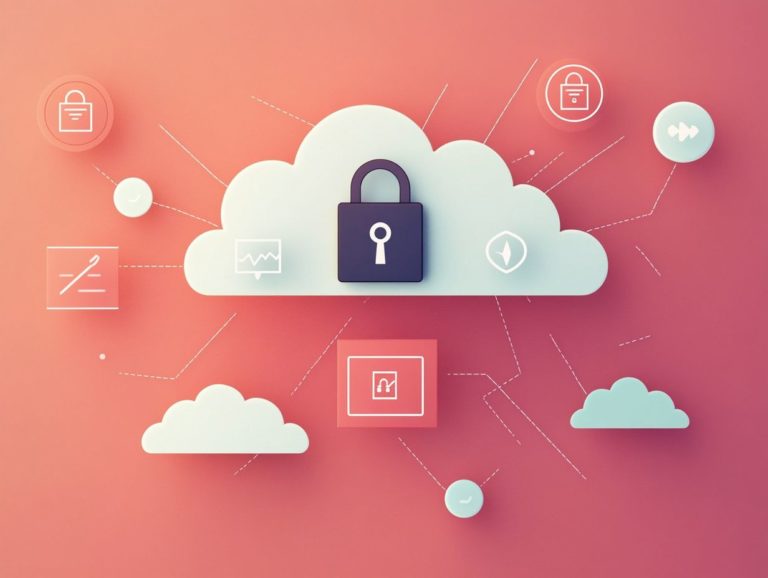Why Cloud Security is Crucial for Businesses Today
In today s digital landscape, cloud security stands as a crucial element for any business aiming to safeguard its critical data and foster trust with customers.
As you turn increasingly to cloud services, grasping the definition and significance of cloud security becomes essential.
This article delves into common threats that jeopardize cloud environments, the potential ramifications of security breaches for your business, and best practices to fortify your defenses.
You ll find guidance on selecting the right cloud security provider, ensuring that your organization s data remains well-protected.
Join us as we explore the complexities of cloud security and empower your business to flourish in a secure digital realm.
Contents
- Key Takeaways:
- Understanding Cloud Security
- Common Threats to Cloud Security
- Impact of Cloud Security Breaches on Businesses
- Best Practices for Ensuring Cloud Security
- Choosing the Right Cloud Security Provider
- Preguntas Frecuentes
- Qu es la seguridad en la nube y por qu es crucial para las empresas hoy en d a?
- En qu se diferencia la seguridad en la nube de la seguridad tradicional en las instalaciones?
- Cu les son los riesgos potenciales de no tener una seguridad en la nube adecuada?
- C mo pueden las empresas garantizar una fuerte seguridad en la nube?
- Existen regulaciones o pautas sobre seguridad en la nube que las empresas deban conocer?
- C mo pueden las empresas mantenerse actualizadas sobre los ltimos desarrollos y mejores pr cticas en seguridad en la nube?
Key Takeaways:

Businesses must prioritize investing in cloud security to protect sensitive data and prevent financial and reputational damage.
Common threats to cloud security include cyber attacks and vulnerabilities, making it essential for businesses to implement proactive measures and risk management strategies.
When choosing a cloud security provider, businesses should consider factors such as experience, reputation, and support services to ensure the best level of protection for their data.
Understanding Cloud Security
Understanding cloud security is essential in today s digital landscape, where organizations rely on cloud service providers, often called CSPs, for their infrastructure, software, and platform needs.
Cloud security involves practices and technologies to safeguard sensitive data. It ensures compliance with regulations like GDPR and PCI DSS while enlightening your stakeholders on the vital importance of strong security protocols.
Organizations are navigating digital transformation especially in challenging times like the COVID-19 pandemic. The fight against cybersecurity threats becomes ever more critical. Adopting effective security measures and practices is not just advisable; it s imperative.
Definition and Importance
Cloud security encompasses a comprehensive array of policies, technologies, and controls designed to safeguard data, applications, and services within cloud environments. This protection ensures that your user accounts and sensitive data remain secure against threats like data breaches.
As organizations increasingly migrate their critical workloads to the cloud, the importance of effective cloud security becomes even more pronounced, exposing them to a range of vulnerabilities. Implementing robust cloud security measures not only protects your sensitive information but also instills confidence in the adoption of cloud solutions.
Leading cloud vendors often deploy advanced encryption protocols, multi-factor authentication, and conduct regular security assessments to identify and mitigate risks. These controls enhance data integrity and provide you with the reassurance that your information is in trustworthy hands.
As a result, organizations can continue to innovate while maintaining compliance with regulatory standards, secure in the knowledge that they have established strong defenses against potential threats.
Common Threats to Cloud Security
Organizations encounter many cybersecurity threats within the landscape of cloud security.
These threats include data breaches, cunning phishing attacks, and Distributed Denial of Service (DDoS) attacks. All of these can significantly jeopardize your cloud resources and operational integrity.
Types of Attacks and Vulnerabilities

Several types of attacks threaten your cloud security. Phishing attacks aim to compromise user accounts, while data breaches exploit weaknesses in cloud applications.
Cyber threats often exploit your organization s potential entry points for hackers. These access points can lead to unauthorized access.
For instance, phishing uses deceptive emails to trick individuals into revealing sensitive information. This could give attackers access to your cloud credentials.
Data breaches happen when attackers exploit security weaknesses. This leaves valuable data exposed.
To protect against these threats, implement strong security protocols like multi-factor authentication and regular audits. Continuous monitoring is also crucial.
These measures significantly reduce risks, ensuring your cloud data remains secure.
Impact of Cloud Security Breaches on Businesses
Cloud security breaches can lead to serious financial and reputational damage. You may face substantial costs related to preventing data loss.
Compliance violations also result in hefty fines. These can erode the trust your brand has built over time.
Prioritize robust security measures to protect your assets and maintain your reputation in the digital world.
Financial and Reputational Consequences
The financial fallout from cloud security breaches can be monumental. The average cost of data breaches continues to climb each year.
Reputational damage can undermine stakeholder engagement and customer trust. This ultimately affects your company s bottom line.
As you navigate modern compliance frameworks like GDPR and PCI DSS, you face pressure to protect sensitive data. Ignoring regulations leads to fines and erodes consumer confidence.
A single misstep can send shockwaves through your brand’s reputation. The cost of non-compliance extends beyond immediate financial penalties.
Integrate proactive risk management into your strategic planning. This keeps you compliant while safeguarding your public image and fostering stakeholder relationships.
Best Practices for Ensuring Cloud Security
To achieve robust cloud security, embrace a comprehensive set of best practices. Take proactive steps to protect sensitive data and refine your security measures continuously.
This commitment is essential to safeguard your organization s assets.
Proactive Measures and Risk Management

Proactive measures in cloud security are vital for effective risk management. Incorporate strategies like continuous monitoring and threat protection to prevent serious data breaches.
These approaches keep a close eye on vulnerabilities. They also empower your employees through comprehensive training programs.
Employee awareness creates a culture of security where everyone feels responsible. Integrating robust threat protection strategies ensures quick responses to attempts at compromising sensitive information.
Partnerships with vendors are also crucial. Evaluate their security protocols to maintain a resilient cloud environment.
Choosing the Right Cloud Security Provider
Selecting the ideal cloud security provider is essential for your business if you seek to safeguard sensitive data and applications. This decision demands a meticulous evaluation of available security solutions, vendor security practices, and adherence to industry regulations.
By doing so, you can ensure that your organization is well-protected against the ever-evolving landscape of cybersecurity threats.
Factors to Consider and Questions to Ask
When selecting a cloud service provider, carefully consider a range of factors, including the effectiveness of their security solutions, compliance with regulations, vendor security practices, and robust access management protocols.
Assess the provider’s ability to handle problems like data breaches, as this reveals their readiness to tackle potential incidents.
Take the time to investigate the provider’s reputation and performance history by examining testimonials or case studies from similar businesses. This will help gauge their reliability.
Make sure the services can scale with your growing business and adapt to your organization’s evolving needs.
Conduct thorough due diligence in these areas, as it significantly enhances your decision-making and plays a vital role in safeguarding sensitive information and maintaining regulatory compliance.
Preguntas Frecuentes
Qu es la seguridad en la nube y por qu es crucial para las empresas hoy en d a?

La seguridad en la nube se refiere a los m todos y tecnolog as utilizados para proteger los datos almacenados en la nube. Es crucial para las empresas hoy en d a porque cada vez m s datos se almacenan y acceden en la nube, convirti ndola en un objetivo principal para los ciberataques.
En qu se diferencia la seguridad en la nube de la seguridad tradicional en las instalaciones?
La seguridad tradicional en las instalaciones implica proteger los datos almacenados en servidores locales, mientras que la seguridad en la nube se centra en asegurar los datos almacenados en la nube. Esto tambi n implica trabajar con proveedores externos para proteger los datos, en lugar de depender nicamente de medidas internas.
Cu les son los riesgos potenciales de no tener una seguridad en la nube adecuada?
Sin una seguridad en la nube adecuada, las empresas corren el riesgo de sufrir violaciones de datos, ciberataques y p rdida de informaci n sensible. Esto puede resultar en p rdidas financieras, da o a la reputaci n y consecuencias legales.
C mo pueden las empresas garantizar una fuerte seguridad en la nube?
Las empresas pueden garantizar una fuerte seguridad en la nube implementando autenticaci n multifactor, actualizando regularmente los protocolos de seguridad y utilizando cifrado para proteger datos sensibles. Tambi n es importante trabajar con proveedores de servicios en la nube de buena reputaci n que tengan medidas de seguridad robustas.
Existen regulaciones o pautas sobre seguridad en la nube que las empresas deban conocer?
S , existen varias regulaciones y pautas, como el Reglamento General de Protecci n de Datos (GDPR) y la Ley de Portabilidad y Responsabilidad de Seguros de Salud (HIPAA), que las empresas deben cumplir en lo que respecta a la seguridad en la nube. Es fundamental que las empresas entiendan y cumplan con estas regulaciones para evitar posibles consecuencias legales.
C mo pueden las empresas mantenerse actualizadas sobre los ltimos desarrollos y mejores pr cticas en seguridad en la nube?
Las empresas pueden mantenerse actualizadas sobre los ltimos desarrollos y mejores pr cticas en seguridad en la nube asistiendo regularmente a conferencias de la industria, manteni ndose informadas a trav s de fuentes confiables y trabajando con consultores o expertos en el campo. Tambi n es importante revisar y actualizar constantemente los protocolos de seguridad para adelantarse a los riesgos y amenazas potenciales.
Listo para asegurar tu negocio? Explora nuestras soluciones de seguridad en la nube hoy mismo.






